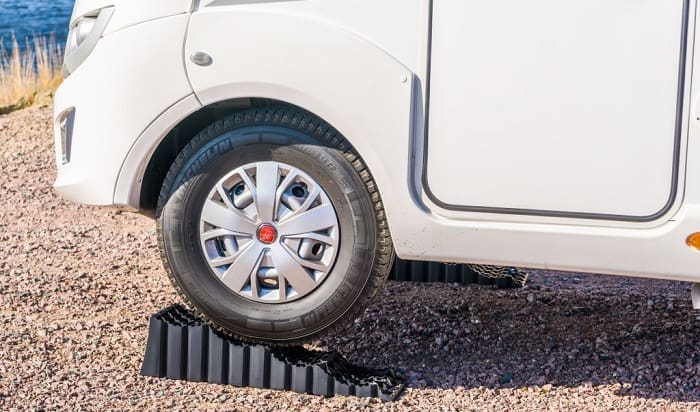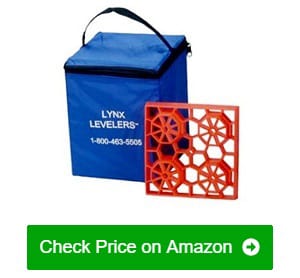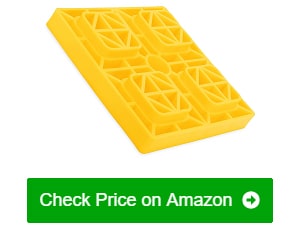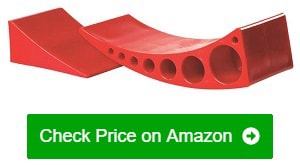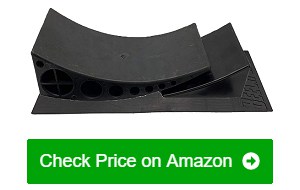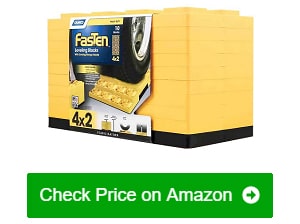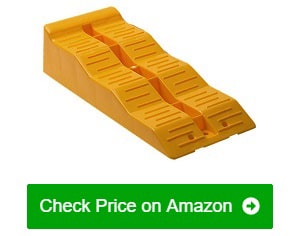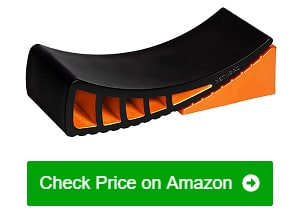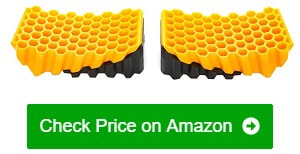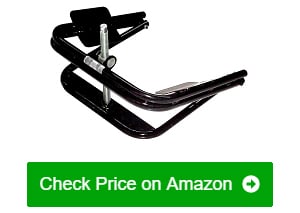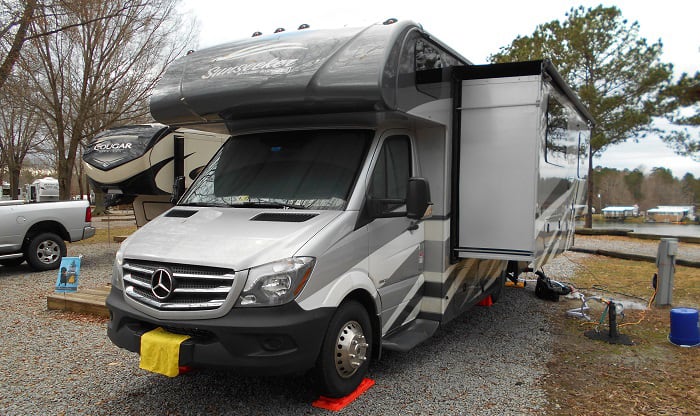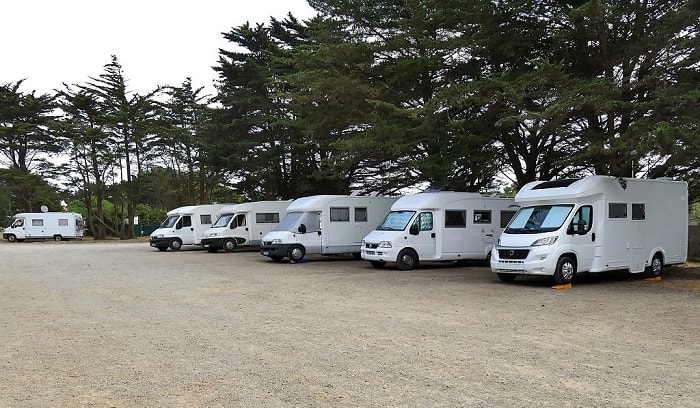Have you tried parking your RV on soft ground or uneven terrain? If so, you should know the difficulty of parking your camping vehicle in these rough locations. First, ensure your RV, camper, or motorhome has the ideal level using the best RV leveling blocks.
Now, you might be wondering about many questions: Which leveling blocks to use? Should you opt for RV levelers for dual wheels? Should you buy an Anderson leveling system or a set of Lynx leveling blocks?
You can make your purchasing decision easier than usual by thinking about certain factors. Some of the elements you need to think about are:
- Type: RV leveling blocks often come in different types, including interlocking blocks, ramps, electric units, and inflatable models. Each kind of leveling block will have its unique pros and cons.
- Load-bearing capacity: Only use leveling blocks for campers, motorhomes, and travel trailers that can handle the vehicle’s weight. Avoid using flimsy models, which would otherwise cause your camping vehicle to maintain misalignment.
- Durability: The RV leveling blocks you choose should also withstand different dangers along with the maximum load-bearing capacity. For instance, plastic models can resist fading, while rubber options are often resistant to weather damage.
Additionally, you should also consider the prices of your preferred product. For example, you might find it interesting to purchase an electric leveling system for your RV. However, the costs for electric models are often significantly higher than plastic or rubber variants. Keep track of your spending allowance to avoid unwanted expenses.
After thinking about some of the factors, it is time to look at some of the best leveler blocks the market offers.
Table of Contents
11 Top-rated RV Leveling Block Reviews
1. Tri-Lynx 00015 Lynx Levelers
I heard many great things about the Tri-Lynx leveling blocks and decided to give it a try. However, my skepticism led to astonishment as these RV leveling blocks exceeded my expectations.
My first test with these interlocking blocks was with a 25-foot Class C camper, and the site for the vehicle had a downward slope. I knew it was a stretch since the site needed ten blocks for a proper level. But these blocks leveled the Class C RV like flat ground.
Plus, the traction on these blocks is top-notch. Unfortunately, the slope where Class C was on was a bit slippery. Yet, the blocks stayed firm, which prevented the vehicle from sliding to a nearby lake. These levelers can hold up to 40,000 lbs of weight.
The convenience is also beyond many of the leveling blocks I experienced. These units interlock with ease, and they did not require more than a few moments of my time to assemble. The package also comes with a convenient nylon bag for easy storage.
- Provides an optimal level to vehicles on sloped surfaces
- Excellent traction prevents sliding on slippery terrain
- Can carry up to 40,000 lbs of vehicle weight
- Blocks interlock and secure with ease
- Package comes with an easy-to-use storage bag
- May deform if placed on rocky terrain
2. Camco 44510 Heavy Duty Leveling Blocks
Like Tri-Lynx, Camco is a brand known by many RV campers throughout the years. I bought these Camco leveling blocks, expecting that they offer excellent features.
Campers will appreciate the compatibility presented by these Camco leveling blocks. These units work with different accessories for camping vehicles, including tongue jacks, stabilizer jacks, hydraulic jacks, and other RV stabilizer blocks.
These Camco RV leveling pieces are also reasonably easy to use. The kit only took a few minutes to assemble, plus extra moments to drive my vehicle over them. Besides, these blocks are in bright yellow, making them visible in the dark. With these features, nighttime leveling for my RV is now easier than before.
Another benefit that I experienced from these Camco leveling blocks is that they hold my RV well. With them, parking my vehicle on a reasonably soft and wet surface is not a hassle. These interlocking levelers still held fairly well when placed on that reasonably unstable terrain.
The package also comes with a zippered storage bag. Plus, this carrying case has a convenient handle, making the set ideal for RVers frequently on the go.
- Compatible with tongue jacks, stabilizer jacks, hydraulic jacks, and other RV tools
- Bright color for fairly easy use in the day and night
- Holds RVs well when used over soft and wet terrain
- Package comes with a zipper carrying case
- The blocks might slip on pavement
3. Andersen 3604 Levelers for RV
These motorhome leveling ramps are an excellent pick for campers who prefer quick-to-install pieces. We can rely on these leveling blocks for a stable hold when we park our RV.
First of all, setting up for these ramps is possible in only three steps. The first step is to push the skinny end of the leveler into the tire. Then, I drove onto the levelers (with the help of an assistant to tell me when to hit the brakes). Finally, I used a chock to secure everything in place. The entire installation only took me about 5 minutes to complete.
Additionally, I like that these levelers work with relatively any RV. Such a versatile use benefits numerous campers with different-sized RVs. Still, I like that these models are resistant to corrosion and mildew to ensure long-term uses.
But I would like to mention that these ramps have a 30,000-pound weight rating. Therefore, adding more weight than necessary might endanger the products and the vehicle’s alignment. Besides,
The brand also added a limited lifetime warranty for these RV levelers. With this extra feature, I can contact the company’s customer service if I encounter certain issues with this product.
- Installation only takes about 5 minutes to complete
- Compatible with many RVs, provided that the vehicles are about 30,000 pounds
- Included limited lifetime warranty
- Resistant to corrosion and mildew for long-term use
- Not ideal for parking in areas with too thick sand
4. Beech Lane BL-115-SIZE Camper Leveler
I was looking for dual wheel leveling blocks and came across this Beech Lane camper leveler. After reading some positive reviews about this leveler for campers, I decided to purchase it.
One of the things that I like about this model is its flexibility. The package comes with two leveling ramp kits, making it suitable for use for either single- or dual-wheeled RVs. These RV leveling blocks for dual wheels can even be cut to fill gaps between the tires of certain camping vehicles.
The nylon polymer construction is also quite solid. It even feels tougher than many low-quality counterparts that I tried using in the past, particularly those made out of high-density polyethylene (HDPE) plastic.
The brand is confident about manufacturing quality, as they apply a lifetime warranty for these products, including levelers and chocks. The notable thing is, this warranty works even when the leveler is already customized.
I also found that the material can hold up to 30,000 pounds of weight. The blocks are slightly heavier than others. Still, these models are not significantly heavy to require assistance for carrying them on and off the parking site.
Installation and fine-tuning with this camper leveler is also a reasonably straightforward affair. It only took about 5 minutes to complete the setup. The removal also took roughly the same amount of time to complete.
- Flexible usage allows use for single- and dual-wheeled RVs
- Nylon polymer construction is reasonably tough
- Can hold up to about 30,000 pounds of weight
- Only takes about 5 minutes to install and remove
- Offers lifetime warranty for levelers, even when being cut
- Slightly heavier than other competing products
- Does not come with a storage bag
5. Camco 21023 FasTen RV Leveling Block
My experience with the Camco FasTen leveling block provided me with both contentment and excitement. Its plethora of practical features releases the happy camper within me.
The first likable feature to mention is the number of leveling blocks included in the package. While many options on the market only supply RVers with two or four blocks, this kit has ten levelers in a single pack. In turn, buying one pack is a more economical purchase than many other choices on the market.
Moreover, the pack also comes with a fairly distinct way of storage. Storing these blocks means stacking them on top of the included base. The base also has a handle, promoting a convenient way to transport the ten leveling blocks to and from the parking site.
Many will appreciate the compatibility provided by these units. For example, people can use these blocks on different RV tools, like tandem axles and RV stabilizer jacks. Plus, these units are usable on both single- and tandem-wheeled camping vehicles.
I also found that the ruggedness of these blocks exceeds many of its competitors, especially when compared to low-quality choices. In addition, the strong and durable build quality is resistant to the elements, particularly from the sun’s harsh UV rays.
- Economical purchase, thanks to the ten levelers included in one package
- Distinct storage process to put the blocks away easily
- Compatible with other tools, such as tandem axles and other stabilizers
- Usable for single- and double-wheeled RVs
- Durable UV-resistant construction
- Might not be ideal for use on rough terrain
6. OxGord ACLR-02 RV Leveling Ramps
Many search the market for a leveling ramp that does not require extra assembly procedures like interlocking blocks. In that case, these OxGord levelers are ideal for purchase. At first glance, I knew that the products’ designs could help improve the level of my RV.
The ramps have notched ridges for reasonably easy adjustments during camper leveling operations. But it also gave me the freedom to raise or lower my RV in three fairly large increments. With these design choices, I was able to find out that these ramps are usable on different surfaces.
Using the ramps on pavements and uneven terrains did not give me a difficult time. Unfortunately, I could not record the time it took to level my RV with these blocks. But the time it took to complete the leveling job only took about a few moments.
Next, I also like that each ramp in the kit only weighs about 4 pounds. In comparison, some RV levelers, regardless of their shapes and sizes, would weigh more than 10 pounds. Therefore, carrying these ramps to and from the parking site did not require me to pull more muscle than necessary.
- Notched ridges on the ramp provide excellent fine-tuning for RV leveling jobs
- Usable on pavements and uneven terrains
- Lightweight 4-pound construction
- Sufficiently durable plastic material can hold up to 11,000 pounds
- Some leveling ramps might do better in carrying heavier loads
7. CARMTEK Camper Leveler Kit
Precision is the name of the game with this camper leveling kit. Using this product for a short period almost immediately made it into one of my favorites.
The first feature that I adored is its jointing system. Its curved design has a plastic construction and comes in two parts. But one component has a rubber shell, enhancing its anti-slip features. As a result, the leveler did not slip on different surfaces, and my camper stayed in place.
Next, I found the maximum weight capacity is comparably higher than many of this product’s competitors. This unit can hold up to 35,000 pounds, and it is compatible with tires up to 32 inches. Plus, it is possible to trim the leveler block if it is longer than required for your specific setup.
Using this model is also reasonably easy. In detail, I was able to level my RV in ½- to 4-inch increments in approximately 5 minutes. Also, once my vehicle was in place, it did not require me to do any additional fine-tuning because the tire stayed in place.
- Unique jointing system for curved levelers provides top-notch anti-slip features
- Maximum 35,000-pound load-bearing capacity is higher than many levelers
- Ends can be trimmed to suit specific leveling demands
- Fairly easy installation process that should not last more than 5 minutes
- Expensive kit might not be suitable for rig owners following strict budgets
8. Camco RV Curved Leveler
I find it uncommon to see a leveler with a honeycomb design. Yet, I found this particular Camco model enticing.
Upon my first-hand experience, this honeycomb look is not only for aesthetics. It serves to provide optimal traction for compatible RVs. Once I backed my vehicle into this RV leveling device, my camper stayed in place.
The honeycomb design also enhances another benefit: durability. With this design choice, it would seem that the manufacturer was able to conjure up a look that can help disperse weight across the product. Some levelers, especially the low-quality options, often concentrate the load of the carried vehicle to one spot, causing fragility.
I also liked that the levelers in the pack come with non-slip rubber grippers. With these accessories, the entire setup was immovable most of the time.
However, I did experience some degree of movement when I parked in a slippery site. It was not a dire issue since I could solve it by adding extra support to the leveler and chock.
- Honeycomb design helps improve traction for compatible RVs
- Appearance also helps disperse weight across the material, increasing durability
- Non-slip rubber grippers help prevent unnecessary slippage
- Compact design makes it possible to install in both single- and dual-wheel RVs
- The product may still slide when used over a slippery surface
9. BAL RV Products 28050 Light Trailer Leveler
Before anything else, take note that this leveler should only be used for a light travel trailer, pop-up campers, and relatively small RVs. Although this leveling device cannot handle heavy camping vehicles, it makes up for this one caveat with many appealing features.
Many campers like the unique and compact design of this product. Yet, despite the distinct look, I found it reasonably easy to install. The device can slip around the wheel of a compatible RV tire (which caters to 13- to 15-inch models).
Additionally, the convenience supplied was outstanding since I could fine-tune the alignment by turning the screw with a wrench. This extra tool is also in the package, which means that you do not have to rush to the store if you lack a wrench in your toolbox.
Also, the design makes it possible to eliminate the need of pulling or backing into a block or ramp-style levelers. The entire assembly only took a few minutes of my time. Moreover, an assistant may not be a requirement in leveling an RV with this leveler.
The metal build is also corrosion-resistant. In turn, I can expect to use this travel trailer leveler for many years.
- Fairly easy install process, thanks to the unique design
- Can slip around the wheel of a compatible RV tire of 13- to 15 inches
- Wrench is included in the package
- Top-notch convenience eliminates the need to back an RV into the leveler
- Corrosion-resistant construction
- More expensive than most conventional models
10. Valterra A10-0918 Stackers RV Leveling Pads
Perhaps if there was one word to describe these Valterra leveling pads, it would be ‘reliable.’ These leveling pads are of good quality and nice design, allowing campers to enjoy stability when parking their RVs.
First of all, each block features a handle. Although this design choice seems quite simple, it is an ingenious addition to the entire setup. With a handle in each pad, it is easier to place and remove the leveler to and from different RV parking setups.
Another characteristic that benefits many rig owners is its versatility. In detail, these leveling pads are compatible with many other RV support products. We can use these pads on things like a jack stand and tongue wheel without them giving me significant trouble.
Plus, the pads can bear weights of up to 40,000 lbs. Therefore, one block can carry a maximum of 10,000 pounds, which is more than enough to lift one RV wheel.
The grooves also help enhance leveling while improving accuracy during installation and stability from use. It is also surprising to see that this superb strength comes from a reasonably lightweight package.
- A handle on each pad, promoting convenient installation and removal
- Versatile usage since the pads are compatible with tongue wheels
- Great maximum load-bearing capacity of 40,000 lbs
- Fairly lightweight construction
- Takes some effort to remove dirt and mud
11. Yosager CLD Camper Levelers
Although many manufacturers vie for cramming the most features out of their camper levelers, Yosager was able to keep things simple with this product.
Its straightforward appearance may not have the bells and whistles found in more expensive models. However, it can still outdo many of its competitors with such a simple yet functional design.
These leveling stacks can bear the heavyweight of different RVs. I should mention that I did not find information about the maximum load-bearing capacity of these levelers. However, I yielded pleasing results with these models from my tests with compatible small- to medium-sized RVs.
These levelers also performed well when placed in different parking sites. It even prevented my RV from sinking when I parked the vehicle on soft ground.
I am also quite amazed by these models’ ability to work with other RV support devices. Each leveling pad did not give me problems when used with other accessories, including stabilizer, tongue, and hydraulic jacks.
Last but not least is the top-notch user-friendliness provided by these blocks. Installation was almost effortless since it did not require me an entire afternoon to complete the setup.
- Can carry small- to medium-sized RVs
- Prevents tires from sinking into soft ground
- Compatible with other devices like different RV stabilizers
- User-friendly operations, thanks to the convenient structure
- An affordable piece with functional and straightforward design
- Might crack or break when used on rough terrain
RV Leveling Blocks Buying Guide
Although the RV leveling block reviews mentioned above provided you with great options, you still need to purchase the right model to meet specific requirements. While you are still at the buying stage, considering the following factors ensures that you gain the most value from your purchase.
Type
Leveling blocks for motorhome generally come in different shapes and sizes. But you can classify these motorhome leveling blocks into main categories, which are:
- Interlocking blocks: Touted as the most basic type, interlocking leveling blocks often appear as square plastic tiles. These models are akin to the reasonably famous Lego toys, albeit they are built for providing RVs with a proper alignment.
- Ramp levelers: As the name implies, RV leveling ramps have a slope that usually allows better fine-tuning than their interlocking counterparts. Additionally, ramp models are often quite convenient to install.
- Inflatable levelers: Inflatable RV levelers are generally small, flat airbags upon taking them out of their packages. Then, you need to inflate them (hence the name) to help provide the correct level to your camping vehicle. But inflatable models often have less flexibility than other types.
- Electric levelers: Electric RV leveling blocks for motorhome arguably provide the best in convenience out of all the RV types. But these models often carry price tags that go beyond thousands of dollars, making them unideal for RV owners on a tight budget.
Maximum Load-Bearing Capacity
You should always consider using heavy-duty RV leveling blocks that can carry the weight of your camping vehicle. Thankfully, many manufacturers of reliable leveling blocks are not shy about disclosing their products’ maximum load-bearing capacities.
Still, herein lies the tricky part of determining how much weight you need when buying RV leveling systems. Here is a shortlist of the different types of RVs and their average weight ranges to help you in your search:
- Class A: 13,000 to 30,000 pounds
- Class B: 4,000 to 9,000 pounds
- Class C: 10,000 to 13,000 pounds
- Travel trailer: 1,100 to 12,000 pounds
- 5th wheel: 7,000 to 20,000 pounds
Durability
One of the most important RV leveling block features that you should pay attention to is the build quality. Take note that the RV leveling pads or ramps you use will bear the entire weight of your vehicle and not only its tires. So if you use an RV leveler with a poorly built construction, you will run into consequences like your camper misaligning suddenly.
Here is a quick comparison between the different materials used in manufacturing RV utility blocks:
- Wood: RV blocks made of wood are usually homemade models. Variants made from this material are often ideal for temporary scenarios rather than permanent parking setups because some types of wood often deteriorate faster than plastic or rubber.
- Plastic: Many if not most leveling blocks you can see on today’s market have plastic constructions. Additionally, many plastic options have weather-resistant properties. Some models even have high resistance against UV, allowing them to maintain their colors for extended periods.
- Rubber: Rubber leveling blocks usually have better protection against the elements than wood or plastic models. Certain options are even made from recycled materials for environment-conscious RVers. However, some options may have a strong smell, which can make installation and use tougher than intended.
Convenience
Perhaps the last thing you would want to experience from using a camper leveler is spending an entire afternoon or day trying to use the product properly.
Some RV campers may find interlocking levelers to be more convenient than using ramps. But if you have the extra cash, you may want to buy an electric RV leveling unit for optimal ease of use.
FAQs
Are RV Leveling Blocks Necessary?
Many RVers swear by using an RV leveling kit whenever and wherever they are needed. The overall camping experience can shift towards the positive end by using the best RV levelers the market can offer.
Although you can still use DIY leveling blocks for RVs, getting the alignment or balance you want from these homemade models can be tough. So instead, you should consider taking the time to browse the market for one of the best RV leveling block sets you can own.
Many modern RV leveling blocks will help provide optimal levels to compatible camping vehicles, and these tools also aid in stabilizing the vehicles. Opt for using a leveler block kit for motorhomes and travel trailers with excellent durability and steadiness. If you pair these tools with RV stabilizer jacks, walking in your camping vehicle might be a similar experience to strolling on the ground.
What Is The Best Way To Level An RV?
The best way to level an RV often depends on the type of vehicle you possess. Leveling a motorhome, Class B, or Class C camper might not have the same process as aligning a travel trailer.
In this section, you can find the differences and similarities between these leveling methods in greater detail:
Leveling a Motorhome, Class B, or Class C RV
- Find a reasonably flat location to park the vehicle temporarily. If you are parking your camping vehicle on uneven ground, make sure that it will not significantly tilt your RV or motorhome.
- Use your preferred RV level to check how much fine-tuning you need to do.
- Measure the vehicle from front to back and left-to-right.
- If the balance is off at the front-to-back measurement, raise both ends of the RV or motorhome using your preferred camper leveling system.
- If the balance is off from the left-to-right orientation, use wheel chocks with leveling capabilities on the tires at the left and right sides of the vehicle.
- If the balance is off from the left-to-right and front-to-back measurements, install camper leveling blocks where they are necessary.
Leveling a Travel Trailer
- Follow steps 1 through 3 from the step-by-step guide on leveling a motorhome mentioned above.
- Place leveling blocks for travel trailers wherever necessary and slowly pull the camping vehicle onto them.
- Lower the trailer’s stabilizers once you are satisfied with the alignment.
At first, it might look easy to level an RV (regardless of size or type) without requiring assistance from others. However, consider having another individual check the level of your vehicle as you pull it onto a camper leveler. Doing so can help you a significant amount of time and effort from fine-tuning the setup.
How Much Weight Can Leveling Blocks Hold?
Different RV wheel levelers generally use dissimilar materials. In other words, one set of camper leveling blocks may not have the same maximum weight capacity as another camper leveling kit.
Still, many interlocking or stackable levelers for campers can carry an RV weight range of approximately 3,000 to 10,000 pounds. Take note that load-bearing capacity found in many product descriptions usually points to that piece of information for each block.
How High Can You Stack RV Leveling Blocks?
The answer to that question depends on the RV tire levelers you are using. Some camper leveling blocks may only provide height adjustment of up to 8.5 inches. Additionally, these units may supply height alterations in 1.50-inch increments.
On the other hand, you may want to use ramp leveling blocks instead of models that stack. RV levelers with a ramp or slope designs often provide better fine-tuning procedures than many blocks.
However, the maximum allowable height for some camping trailer levelers, particularly those with ramp-like constructions, cannot only go up to four inches. Therefore, make sure to check the product’s description before buying it to avoid the hassle of buying the wrong model.
Moreover, take note of the limitations of certain RV leveler models. For example, an RV leveling blocks Harbor Freight variant may only supply users with up to three stages of stackable height.
How Do You Make RV Blocks Leveling?
You might need RV and trailer blocks in certain scenarios, such as boondocking. However, accessing an RV supply store is not possible currently. If so, here is a quick guide to help you make a DIY RV leveling system.
What You’ll Need
- Saw
- Measuring tape
- Belt sander or sandpaper
- Screwdriver and screws
- Heavy-duty glue
- Two 8-foot 2 x 10 timber planks
Step-by-Step Guide
- Step 1: Measure the axles of your vehicle from one center to another. Then, measure the distance between the ground and your vehicle’s tires.
- Step 2: Use the saw to cut one of the planks. Make sure that the cut size matches the distance measured between the ground and the tires.
- Step 3: Sand a bevel to both ends of the wooden plank.
- Step 4: Repeat steps 2 and 3 for the other plank. But this time, only make a bevel on one end.
- Step 5: Find and mark the center of both planks.
- Step 6: Place the single-bevel plank on the longer board. Make sure to align the straight edges.
- Step 7: Measure the distance from the center of both wooden planks and mark it.
- Step 8: Align the short piece to the long board while following the marked path.
- Step 9: Park your RV onto these wooden motorhome levelers to test.
Take note that using these homemade RV leveling blocks may not replace factory-made models. Although homemade leveling blocks can be ideal for boondocking, using your leveling blocks might not be suitable for permanent locations. Many issues can come to mind, such as the inability to fine-tune the leveler with utmost convenience.
If you decide to use a DIY camper leveling system, do not forget to buy reliable commercial models. That way, you can easily adjust your RV’s level without having to build RV leveling pads from scratch.
How Many Leveling Blocks Do You Need?
A general rule of thumb to know the right amount of trailer leveling blocks to use is to know the number of tires on your camping vehicle. The number of blocks used should coincide with your RV’s equipped tires. Therefore, if you are a proud owner of an RV with six wheels, make sure to use six camper wheel levelers.
Additionally, the number of blocks needed might change based on the products’ design. For instance, you might need to use a pair of Anderson leveling blocks because of their curved ramp designs.
Make sure to read the product description, especially if you are buying online. That way, you will have a general idea of the number of leveling blocks you need for your desired setup.
Conclusion
Now that you are at the end of this guide, you should have a better idea of the best RV leveling blocks. Remember, take the time to think about the different vital factors before you finalize your purchasing decision. Make sure to maintain and care for the pieces after using them to lift your heavy RV.

Hi, I am Joseph. Carpe diem! Seize the day! That’s always been my life motto. If you haven’t seen some of the most beautiful places in the country, you are missing out on incredible adventures.


